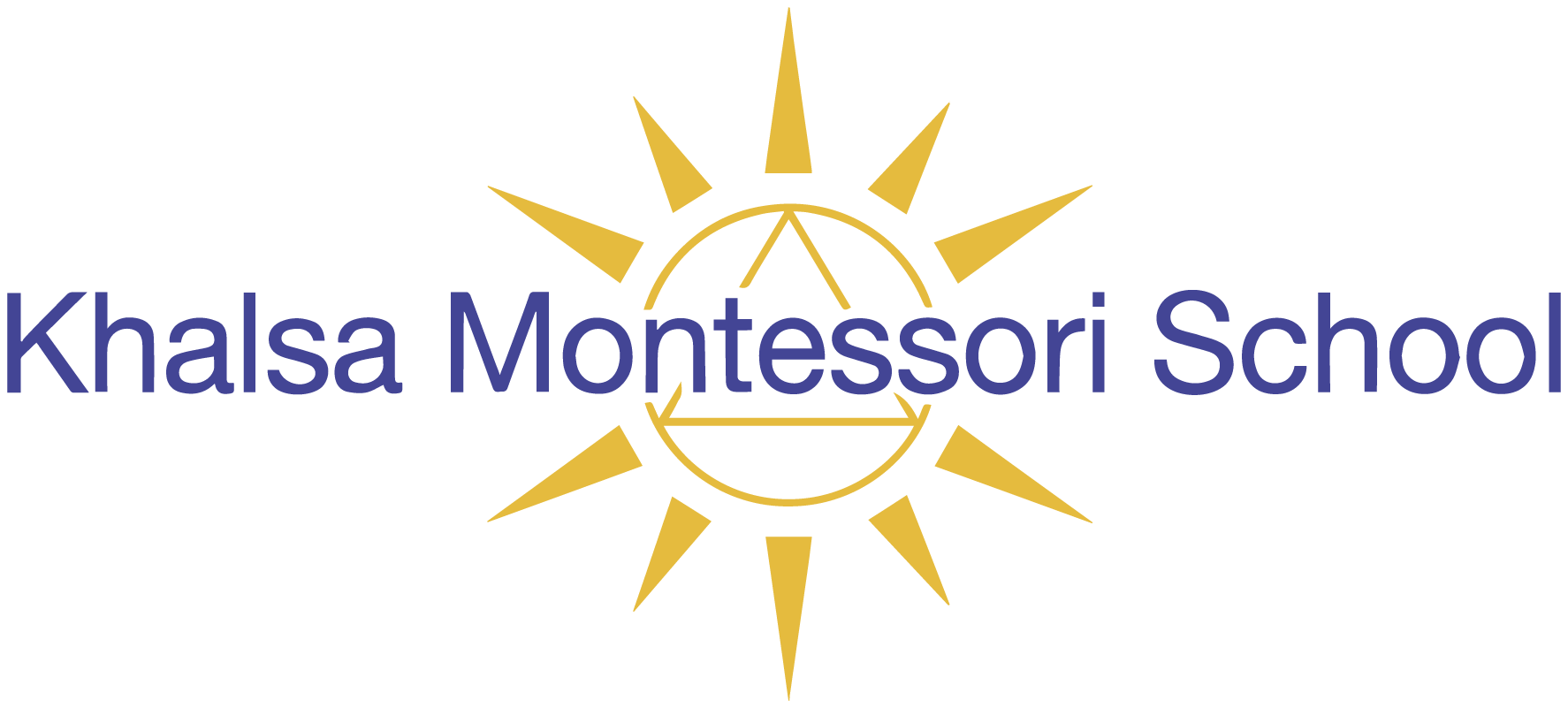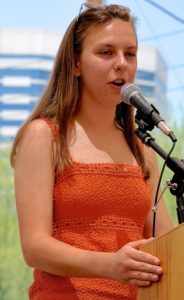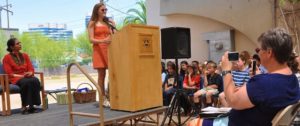Isabel Coffey
Graduate of Khalsa Montessori School and Veritas Preparatory Academy, Phoenix, AZ.
Attending Valparaiso University, Valparaiso, Indiana.
Good morning! I am so excited to be back at Khalsa School today. For those who don’t know me, I am Isabel Coffey. I graduated from Khalsa School six years ago and I just graduated from high school at Veritas Prep. As many of you know who have seen this ceremony before, this day focuses on Khalsa’s sixth years.While I will be addressing the final years most of all today, I don’t want the rest of you to zone out, because you’re well on your way to becoming final year students yourselves.
When I attended Khalsa Montessori six years ago, I had a slightly different experience than a lot of you have had. I started at Khalsa as a fourth year, and the transition was difficult. I felt like I had jumped into an ice-cold lake and then forgotten how to swim. As a new fourth year, whenever I finished one work, I would sit and do nothing, waiting for a teacher to come check. Ms. Lindsay had to approach me multiple times and remind me to work on something new while I waited. This wasn’t because I was a negligent student—I was just used to a much different classroom setting, coming from a “regular” elementary school. What I’m trying to say is that Khalsa was a learning curve for me. At the beginning of my time at Khalsa, my teachers had to hold my hand sometimes, and help me figure out how to learn best in the Khalsa environment. In the end, Khalsa turned out to be an ideal environment for me. I just had to take a little time to adapt.
Looking back, I have realized that Khalsa taught me two lasting lessons. I’m not talking about math or grammar lessons. Of course, those are important too, and I have seen over and over again how my Montessori foundation has helped me learn more easily, but that’s not what I want to talk about today. Today I want to focus on two lessons that I argue are more important.
As I began to say earlier, when I first came to Khalsa, I had no idea what I was doing. All my classmates would say, “Oh, this is just like in Ms. Susan’s class!” I felt lost. I didn’t know what they did in Miss Susan’s class! But then I became a fifth year, and then a sixth year, and by then, I had figured it out. I got a little older and Ms. Lindsay didn’t have to hold my hand anymore. I could manage my work-plan, homework, and extracurriculars by myself! And then, I graduated from Khalsa, just like you’re about to, and I went to Veritas Middle School. Suddenly everything was different again. I did not know how to learn effectively at Veritas, but I did know that I had done this before. I remembered struggling to adapt at Khalsa, and I realized that I was capable of adapting again. Soon enough, I had Veritas figured out, and middle school and high school flew by. Now I’m about to leave for college, and if the past is any indicator, I’ll be able to figure out how best to learn there, too. It’ll be new, and different, but far from impossible. And so on, with each chapter of my life. What I’m getting at is that at Khalsa School, you have learned to be self-directed problem solvers. You have learned—whether you realize it or not—how to adapt. The culmination of so many little things you’ve done each day for the past six or eight years has cultivated within your minds all the tools you need to succeed anywhere you go. As long as you keep us- ing those tools, you will figure out how to learn and grow next year in middle school, as well as each year moving forward. I think that’s pretty cool, because a lot of my friends at Veritas still don’t have that tool-belt, and we’re heading off to college. How many times have you asked your teacher a question, only to have them ask you one right back? How many times have they told you to keep thinking about something until you figure it out? How many times have they come to check your work and told you something wasn’t quite right, reminding you to try it again? They don’t do that to annoy you. They do it to show you that if you’re stuck, lost, or confused, like I was as a new fourth year, you can change that. That lesson is so valuable to me, because it gives me the confidence to go forward into unknown situations with excitement rather than fear. You cannot fully realize it now, but you too have begun to develop this confidence.
The second enduring lesson I learned at Khalsa has to do with a word you probably hear a lot: community. Khalsa’s big on this one, right? Class meetings, games at recess, after care, group work— you know what I’m talking about. After a while, Khalsa starts to feel like home. You’re in the classroom with different grade levels so that you can learn from one another. I remember being a fourth year asking a final year for feedback on my writing; I remember being the final year whom a fourth year asked for feedback. Khalsa is awesome because it let me be both a learner and a leader. You final years have all felt this. That ability to lead with kindness is of the utmost importance in cultivating a learning community. When I was at Khalsa, I loved playing games with my classmates at recess as well as talking with my teachers in the mornings. I loved that we called our teachers by their first names, because it reminded me each day that we were all on the same team in the classroom and out of it, working together to learn and love. The most distinct characteristic of Khalsa School that I noticed over and over again was the loving community. At my old school, before Khalsa, people were pretty mean. The teachers were untouchable. At Khalsa, you have meetings to figure out how to make the classroom run smoothly. People are usually nice and when they aren’t, you address it. Teachers sit down next to you and show you how to use test-tubes. When I first arrived at Khalsa, I was genuinely surprised by how nice everyone was. The love I still receive from the Khalsa community is verging on shocking to me because that kind of community is so rare. Even today I strive to give love back to the Khalsa community because I still feel like a part of it. I suspect that years down the road, when I come back home to Phoenix, I’ll stop by Khalsa to say hello. People here care for one another. It’s incredible, but it shouldn’t be so unusual.
Many of you experienced lower elementary, so you remember singing “We Are the World” at the Holiday Program. I invite you now to think about those words for a minute:
We are the world,
We are the children,
We are the ones to make a brighter day,
So let’s start giving.
There’s a choice we’re making,
We’re saving our own lives,
It’s true we make a brighter day,
Just you and me.
Listen to that! Just you and me.We are the world. We have felt how important a loving community can be. And now, although you final years are physically departing from this community, spiritually and emotionally you are taking this community with you. It is up to you— because you already know how valuable this love is—to bring it wherever you go, and share it with other people. It’s a choice you get to make. You get to go out to middle school, high school, and beyond, and make a brighter day. You get to start giving. I encourage you to keep this in mind as you move forward: you have the power with you, right now, to give love. When someone is mean or selfish—which will happen—you have the power to give them love in return. When someone is sad, hurt, or lonely, you have the power to give them love. Remember that you posses this power, and use it as much as you can. at’s how you can make a brighter day, foster a strong community, and change someone else’s life.
In conclusion, I want to tell you guys that I’m proud of you. I was in your seat once, not too long ago, so I know you’ve done a lot. You survived the sixth-year research project! You’ve completed dozens of science experiments, picked up a ridiculous number of peg-board pegs when they scattered across the carpet, been victorious in harrowing games of four-square…You’ve learned so much. Congratulations! Now, go forward, have a relaxing summer, and remember that wherever you are and whatever you’re doing, you have been prepared to succeed and you have the power to give love.
With that, I bid you a joyous good- bye.


